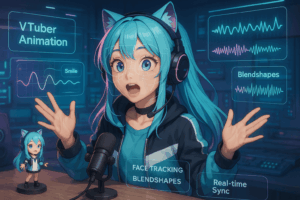The gaming industry has witnessed a remarkable surge in the popularity of Indie Games. These independently developed titles, crafted by small teams or even individual creators, have attracted players worldwide. Their creative gameplay mechanics, unique art style, and compelling narratives captivate audiences. As indie studios continue to release innovative titles, the landscape of video games evolves. Consequently, players have a diverse range of experiences to enjoy. The dedication and passion of indie game developers have cemented their place in the gaming industry. They inspire future generations of creators.
In this blog, we will explore indie game development, delving into what defines indie games and who indie developers are. We’ll also discuss making games for them and factors contributing to their popularity.
Basics about Indie Games and Indie Developers
Indie games, short for independent game, refer to video game created by individuals or small teams without the backing of major publishers. Indie developer, often operate outside the traditional studio system, relying on their own resources and ingenuity to bring their visions to life. These games encompass a wide range of genres, styles, and themes, reflecting the diverse interests and creative impulses of their creators. Moreover, they showcase the breadth of creativity present in the gaming industry.
Indie Developer and their Role in the Gaming Industry
Indie developers come from diverse backgrounds and walks of life, united by their passion for game development and their desire for creative autonomy. Many indie developers are self-taught or have backgrounds in fields outside of game development, bringing a diverse range of perspectives and skills to their projects.
Despite operating on a smaller scale than their mainstream counterparts, indie developers play a vital role. They contribute in driving innovation and diversity within the gaming industry. Their willingness to take risks, explore new ideas, and challenge established norms enriches the medium. Consequently, it inspires future generations of devs.
Characteristics that Differentiate Indie Games from Mainstream Titles
Freedom of Creativity:
Unlike mainstream titles driven by commercial interests, indie games thrive on creativity and artistic expression. They have the freedom to explore unconventional ideas, experiment with unique gameplay mechanics, and delve into thought-provoking themes without the pressure to appeal to a mass audience.
Innovation Over Conformity:
Indie games prioritise innovation over conformity to industry norms. Instead of following established trends, developer are encouraged to break new ground, challenge conventions, and push the boundaries of interactive entertainment. This emphasis on innovation results in fresh and original gaming experiences that captivate players with their ingenuity.
Exploration of Niche Genres:
Indie games have the flexibility to explore niche genres and cater to specific audiences overlooked by mainstream titles. Whether it’s a niche subgenre, a niche art style, or a niche gameplay mechanic, developer have the freedom to explore into areas of play that may not have broad appeal but resonate deeply with passionate enthusiasts.
Thought-Provoking Themes:
Indie games often tackle thought-provoking themes and narratives that delve into complex human emotions, social issues, or philosophical concepts. By addressing topics that are less commonly explored in mainstream games, they invite players to engage with challenging ideas and meaningful storytelling that leaves a lasting impact.
Distinctive and Memorable Experiences:
Overall, indie games offer experiences that are truly distinctive and memorable. From their unique art styles to their innovative gameplay mechanics, indie titles stand out from the crowd and leave a lasting impression on players. By prioritising creativity and artistic expression, indie developer create games that resonate on a deeper level and forge meaningful connections with their audience.
The Rise of Indie Games Developer
Indie game development has undergone a remarkable evolution over the past few decades. What began as a grassroots movement driven by passionate hobbyists and enthusiasts has since grown into a thriving industry with global reach and influence. The advent of digital distribution platforms, crowdfunding sites, and accessible game development tools has democratised the process of game creation, empowering indie developers to realise their visions without the need for traditional publishing deals or extensive financial resources.
Key Players in the Indie Gaming Scene
The indie gaming scene is home to a vibrant community of creators, artists, and enthusiasts who collaborate, share resources, and support one another’s creative game. Indie game festivals, conventions, and online communities provide opportunities for an indie developer to showcase their work, network with peers, and connect with players. These gatherings foster a spirit of camaraderie and mutual support, helping to nurture the next generation of indie talent and fuel the continued growth of the indie gaming scene.
Successful Games of Independent Developers:
Several independent developers have achieved notable victory and recognition within the gaming industry. Hello Games, the studio behind the procedurally generated space exploration game “No Man’s Sky,” garnered widespread attention for its ambitious scope and innovative gameplay mechanics. Telltale Games revolutionised narrative-driven gaming with its episodic adventure titles such as “The Walking Dead” and “Tales from the Borderlands,” earning critical acclaim and commercial success. Supergiant Games, known for titles like “Bastion,” “Transistor,” and “Hades,” has established itself as a leading voice in the gaming scene, renowned for its distinctive art style, compelling narratives, and innovative gameplay.
Impact of Indie Games on the Video Game Industry:
Indie games have had a profound impact on the video game industry, challenging established conventions, inspiring new trends, creating, and pushing the medium forward in exciting directions. Indie devs have pioneered new gameplay mechanics, storytelling techniques, and artistic styles that have influenced mainstream game development and captured the imagination of players worldwide. Additionally, the victory of indie devs through video game has demonstrated the viability of alternative business models, such as crowdfunding and early access, providing a blueprint for other developer seeking to bring their projects to market outside of traditional publishing channels.
Characteristics of Indie Games industry
Indie games are renowned for their distinct characteristics that set them apart from mainstream titles. These defining features contribute to their allure and appeal to a wide range of players:
Unique Art Styles and Creative Aesthetics:
Indie games often boast visually stunning art styles and creative aesthetics that captivate players from the moment they launch the first game ever. Whether it’s hand-drawn illustrations, pixel art, or abstract designs, indie developer leverage a variety of artistic techniques to create visually striking experiences that leave a lasting impression.
Emphasis on Storytelling and Narrative Innovation:
Storytelling lies at the heart of many indie games, with developer placing a strong emphasis on crafting compelling narratives and engaging player experiences. Indie titles often explore unique and thought-provoking themes, weaving intricate stories that resonate with players on an emotional level. This commitment to narrative innovation sets indie games apart and elevates many games them to the realm of interactive storytelling.
Flexibility and Creative Freedom in Development:
Indie developers enjoy unparalleled creative freedom and flexibility in the development process, allowing them to pursue their artistic vision without constraints. Freed from the pressures of corporate mandates or market demands, indie creators can experiment with unconventional ideas, take risks, create, and push the boundaries of game design. This freedom fosters innovation and encourages developer to explore new avenues of gameplay and expression.
Unconventional Themes and Gameplay Mechanics:
Indie games are celebrated for their willingness to explore unconventional themes and gameplay mechanics that defy genre conventions. From philosophical explorations to experimental gameplay mechanics, indie developers embrace innovation and challenge players’ expectations, resulting in gaming experiences that are both refreshing and intellectually stimulating.
Pros, Cons, and Costs of Indie Game Development
Indie game development offers a unique set of advantages and challenges that aspiring game developer must consider carefully:
Pros: Creative Control, Flexibility, Potential for Storytelling
Indie game creators enjoy unparalleled creative control over their work, allowing them to realise their artistic vision without interference from publishers or shareholders. This autonomy fosters innovation and experimentation, leading to the creation of games that defy conventions and offer fresh experiences to players. Additionally, indie teams have the flexibility to explore niche genres, themes, and gameplay mechanics that may not be viable in mainstream development. This freedom allows for the exploration of unique storytelling opportunities, resulting in games that resonate deeply with players and leave a lasting impact.
Cons: Limited Resources, Smaller Budgets, Higher Risk
Despite the benefits of creative freedom, indie development faces significant challenges due to limited resources and smaller budgets. Unlike mainstream studios backed by major publishers, indie teams often operate on shoestring budgets, relying on personal savings, crowdfunding, or revenue from previous projects to fund their endeavours. This financial constraint can impact every aspect of game development, from hiring talent to marketing and distribution. Additionally, indie creators must contend with the inherent risk involved in creating and releasing games independently. With no guaranteed financial return, indie task carry a higher risk of failure, making each decision critical to the final outcome of the game.
Costs: Development Costs, Time Investment, Financial Considerations
The costs associated with indie game development can vary widely depending on the scope and scale of the project. Development costs encompass expenses such as software licenses, hardware, outsourcing, and marketing. Indie creators must carefully budget and manage these costs to ensure the successful completion of their games. Moreover, indie game development requires a significant time investment, with creators often working long hours to bring their projects to fruition. This dedication and perseverance are essential for overcoming the challenges inherent in indie development. Financial considerations extend beyond the development phase, encompassing ongoing support and updates post-release. Indie creators must plan for the long-term sustainability of their projects, considering factors such as community engagement, post-launch support, and the potential for sequels or expansions.
How much can you earn as an Indie Game Developer?
In the dynamic world of indie game development, potential earnings can vary widely depending on various factors. Let’s delve into the intricacies of revenue generation and explore real-world examples of financial outcome:
Indie game developers have the potential to earn significant revenue through various channels, including game sales, crowdfunding campaigns, and royalties from licensing deals. With the rise of digital distribution platforms and the increasing popularity of indie games, the opportunities for financial outcome have never been greater.However, it’s essential to understand the factors that influence revenue generation. Additionally, indie developers may face challenges along the way.
Factors Influencing Revenue Generation for Indie Game Developers
Game Sales: Game sales constitute a primary source of revenue for indie studio. Successful titles can generate substantial income through digital storefronts like Steam, Epic Games Store, and Nintendo eShop. By reaching a global audience through these platforms, indie studios can monetize their creations. As a result, they earn revenue from every copy sold.
Crowdfunding Platforms: Crowdfunding platforms such as Kickstarter offer indie developer an alternative avenue for securing funding directly from fans and supporters. By presenting their sequel to the public and offering rewards in exchange for financial contributions, indie studio can bypass the need for traditional investors or publishers. Crowdfunding campaigns provide an opportunity for a developer to gauge interest in their project. Additionally, they secure funding to bring their visions to life.
Royalties from Licensing Deals: Royalties from licensing deals with publishers or platform holders can contribute significantly to the financial success of indie games. By partnering with established companies to distribute their games on consoles, mobile devices, or other platforms, indie developers can access wider audiences and benefit from the marketing and promotional efforts of their partners. These licensing deals often involve revenue-sharing agreements, enabling indie developers to earn royalties. Consequently, their income is tied to the sales or performance of their games industry.
Success Stories in Indie Game Development team
The success stories of indie game developer are abound, showcasing the creativity, innovation, and dedication of teams striving to make their mark in the industry. Let’s explore some notable examples of successful indie games:
Outer Wilds:
Developed by small team from San Francisco, “Outer Wilds” captured the hearts of players and game critics alike. Moreover, it impressed them with its captivating story, innovative gameplay mechanics, and stunning visuals. Released to critical acclaim, this indie gem became a critical darling, praised for its unique narrative structure. Furthermore, it received accolades for its immersive exploration of space.
Stardew Valley:
Created by indie devs ConcernedApe, “Stardew Valley” took the gaming world by storm with its charming blend of farming simulation, role-playing elements, and heartfelt storytelling. Originally released on PC, the game later found success on the Nintendo Switch, allowing players to experience the joys of rural life on the go. Furthermore, its success paved the way for a sequel, expanding the beloved universe created by its own game devs.
Dadliest Catch:
Developed by studio Young Horses, “Octodad: Dadliest Catch” is a hilarious and unconventional game that challenges players to navigate the daily life of an octopus masquerading as a human father. With its quirky premise, intuitive controls, and wacky physics-based gameplay, the game earned a dedicated following and garnered critical acclaim upon its release.
Lost Signals:
A lesser-known but equally impressive story, “Lost Signals” is a narrative-driven adventure game developed by indie studios in collaboration with studio Annapurna Interactive. Set in a mysterious world filled with intrigue and danger, the game captivated players. Moreover, its immersive story, atmospheric sound effects, and breathtaking visuals heightened the experience.
Hello Games’ No Man’s Sky:
Despite facing challenges during its initial release, “No Man’s Sky” developed by Hello Games has evolved into a commercial success story. With ongoing updates and expansions released since, the game has transformed into a beloved title known for its vast, procedurally generated universe and exploration gameplay.
Supergiant Games’ Hades:
Developed by Supergiant Games, “Hades” is the sequel to a critically acclaimed roguelike dungeon crawler that has achieved both critical and commercial success. With its stylish art, compelling narrative, and addictive gameplay, “Hades” has earned multiple awards and accolades, cementing Supergiant Games’ reputation as a leading indie devs.
Telltale Games’ The Walking Dead:
Telltale Games’ episodic adventure series, including “The Walking Dead,” became a commercial success and critical darling. The series resonated with players due to its narrative-driven gameplay and emphasis on player choice. In addition, this success spawned multiple titles and secured Telltale Games’ legacy in the gaming scene.
The success stories of most games showcase their passion, creativity, and perseverance amidst challenges. They inspire other games worldwide, to create and demonstrate the potential for unique experiences in the game scene. These achievements, seen in titles like “Outer Wilds,” “Stardew Valley,” and “The Walking Dead” by Telltale Games, underscore the impact of indie studios in the video game industry. As more successful games are released, players can support indie devs, fostering a vibrant ecosystem. These successes also pave the way for sequels and further innovation, enriching the game landscape with diverse and engaging experiences.
Why are Indie Games so popular?
Indie games have witnessed a remarkable surge in popularity in recent years, captivating both players and critics alike. This widespread appeal can be attributed to several key factors. Firstly, indie devs enjoy a remarkable degree of creative freedom and experimentation not often found in mainstream game development. This liberty allows indie developers to explore innovative ideas and take risks not viable in larger studios. It results in groundbreaking games that push boundaries and offer fresh experiences.
Secondly, indie games often cater to niche audiences with specific interests or preferences that mainstream titles may overlook. Indie creators establish deep connections with players by focusing on niche genres, themes, or gameplay mechanics. Players appreciate their unique approach and attention to detail. This connection fosters a sense of community and loyalty among players, further contributing to the popularity of indie games.
Lastly, Indie games are often more accessible and affordable than mainstream ones, appealing to budget-conscious players. Moreover, they also offer diverse gaming experiences. The advent of digital distribution platforms and indie-friendly storefronts enables indie devs to reach a global audience easily. However, this ensures their video games are readily available worldwide. Indie studios and games benefit from accessibility, reaching a broad audience. This sustains their success in the gaming industry’s dynamic landscape.
The Rise of Indie Games: A Digital Distribution Revolution
The turn of the millennium marked a significant shift in the landscape of video game development and distribution. This catalyzed the rise of indie games as a prominent force within the industry. With the advent of digital distribution platforms in the early 2000s, indie video game developers found themselves presented with opportunities. Consequently, they could create, release, and distribute their own games to a global audience.
Indie game developers, often working with small teams or even as solo creators, seized upon the newfound accessibility and affordability of digital distribution to bring their visions to life. Indie game developers, freed from traditional publishing constraints, experimented with innovative gameplay mechanics and storytelling. Further, they explored niche genres and pushed interactive storytelling boundaries, once deemed impossible.
The release of the first indie games through digital distribution platforms marked the beginning of a revolution. These games sparked a transformative shift in the gaming industry. Titles like “Braid,” “World of Goo,” and “Super Meat Boy” captivated players worldwide. Moreover, they showcased the creative and commercial potential of indie games. The early successes paved the way for a new generation of indie games. The number of releases grew exponentially, encompassing diverse genres, styles, and themes.
The successful outcome of indie games can be attributed to several key factors.
Self-publishing via digital storefronts enables indie game developers to bypass traditional gatekeepers, reaching audiences directly. This fosters a more diverse and inclusive gaming ecosystem. Additionally, indie game studios benefit from low entry barriers, allowing them to create games with minimal resources. Further, this democratizes game development, empowering a new generation of creators.
Successful indie games gained traction, attracting attention from larger publishers and mainstream developers. This led to collaborations, elevating indie games’ profile. Sequels to successful indie titles emerged, building on the foundations laid by their predecessors. Moreover, they expanded the scope and ambition of indie game development.
Challenges and Rewards of Indie Game Development Team
Development Costs and Funding Challenges of Indie Games:
One of the foremost challenges faced by indie game developers is securing funding to cover costs of development. Unlike mainstream developers supported by large publishers, indie developers often rely on personal savings or crowdfunding. They may also use revenue from previous projects to finance their endeavors. Limited resources and smaller budgets can pose significant obstacles for developers. They must be resourceful and strategic in managing finances during development.
Utilisation of Various Programming Languages and Tools:
Indie game developers require diverse skills, proficient in various programming languages and tools. Game developers utilize various tools like C++, Unity, and Unreal Engine to craft immersive video games. Consequently, this adaptability enables exploration of diverse approaches. It also helps meet industry’s evolving demands.
Embracing Early Access and Community Feedback:
Embracing access and soliciting feedback from the community can be both a challenge and a reward for independent game developers. Early access offers an opportunity to engage with players, gather feedback, and iterate on their games. Subsequently, it also exposes them to criticism. Moreover, game developer must navigate the balance between maintaining creative integrity and incorporating valuable feedback to enhance the quality.
Balancing Creative Vision with Commercial Success of Indie Games:
Perhaps the most significant challenge for indie game developers is balancing their creative vision with the demands of commercial value. While developer are driven by a passion for creating their own games and medium. However, they must also consider the marketability and financial viability of their project. Striking the right balance between artistic expression and commercial appeal is essential for game developer to succee. This is important in an industry dominated by mainstream developers and development studios.

The Future of Indie Game Development
As we look to the future, the outlook for indie game development is bright. Advances in technology, like virtual reality and cloud gaming, promise fresh opportunities for game developers. The rising acclaim for indie games implies continued growth, fostering diverse voices and visions. However, this trend suggests an enduring platform for creativity. It’s a testament to the evolving landscape of gaming.
However, the future of indie game development is not without its challenges. As the market saturates, game developers must innovate to stand out and engage audiences. The changing distribution landscape offers opportunities and challenges. Game developers strive for global reach and financial stability. Moreover, adaptation is crucial in this dynamic industry.
Conclusion
Indie games is reshaping the landscape of interactive entertainment and captivating players worldwide. Throughout this journey, indie game studios and independent developers have made invaluable contributions to make successful indie games. The enduring popularity of indie games can be attributed to several key factors. Their ability to innovate, experiment, and explore new frontiers in game design has captured the imagination of players. Moreover, this offers fresh and engaging experiences that push the boundaries of storytelling, gameplay, and artistic expression. Indie games have also fostered inclusivity, inviting players to explore diverse worlds that reflect the perspectives of indie game developer.
In addition, indie game developer can collaborate with 3Daily to speed up their game development process. As many independent studios lack in-house artists, you can create 3D models directly from our tool. Furthermore, we can provide access to skilled 3D artists to assist your project or provide retouching services. We offer invaluable support to indie game developer striving to bring their visions to life. Sign up today!!




